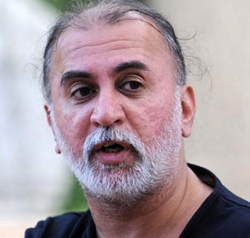 Panaji, Nov 29: Tarun Tejpal, accused of sexual assault on a woman colleague, today got interim bail till 2.30 PM from the Sessions Court here which will pronounce its final order later in the afternoon.
Panaji, Nov 29: Tarun Tejpal, accused of sexual assault on a woman colleague, today got interim bail till 2.30 PM from the Sessions Court here which will pronounce its final order later in the afternoon.
Sessions Judge Anuja Prabhudesai gave Tejpal interim protection from arrest on a bail application moved by his lawyers.
Tejpal's lawyers moved the court for bail after a joint team of Goa and Delhi police went to his residence in South Delhi's Jungpura to arrest him this morning but did not find him there. Later they carried out searches at various other places, including that of his relatives.
Tejpal's lawyer Geeta Lutha told reporters later that he has been given interim bail till 2.30 PM.
Tejpal, the founder editor of Tehelka magazine, has been accused of sexually assaulting his colleague during an event organised by the magazine in a five star hotel here earlier this month.
"We moved for anticipatory bail since it is the right of all citizens to have liberty. Even the Supreme Court has said that liberty of a person should not be interfered with," Luthra said.
She said Tejpal has already sent a letter to Goa police saying he will cooperate with them. "It is not that we are going away. We will cooperate."
When asked where Tejpal is, she said Tejpal has to be available to the court and police and would come at an appropriate time.
The lawyer said the police have only issued summons and he has to be given reasonable time to present himself before the Investigating officer.
A person who does not live in the city needs time to present himself before the authority, she said and claimed that Tejpal has maintained respect for the law. He has tried to do everything by the law.
"We are saying that the person has to be heard. He will speak to the police and will cooperate with them," she said.
Tejpal's wife Geetan Batra refused to divulge to the police any detail of his whereabouts, police said after they raided his residence.
The police action came after they rejected Tejpal's request for time till Saturday to appear before them.
On Wednesday, Goa police had directed Tejpal to appear before it by 3 PM yesterday. The direction had come after the victim, who has alleged that she was sexually assaulted by him in a lift in a five-star hotel in Goa, recorded her statement under Section 164 of CrPC before a magistrate in Panaji.
The controversy also saw resignation of Shoma Chaudhury as Managing Editor of Tehelka, who is being accused of attempting to cover up the matter.
Chaudhury sent her resignation yesterday as there was speculation that she may also be named in the FIR for certain alleged acts of omission and commission after the scandal became public.
Earlier:
Goa police raids Tejpal's home, finds him missing New Delhi, Nov 29: A Goa police team today raided Tehelka Editor Tarun Tejpal's house here in a bid to arrest him but returned empty handed after finding that he was not there.
New Delhi, Nov 29: A Goa police team today raided Tehelka Editor Tarun Tejpal's house here in a bid to arrest him but returned empty handed after finding that he was not there.
Armed with a non-bailable warrant, the team reached the residence of Tejpal, who has been accused of sexually assaulting a woman colleague, in Jungpura area of South Delhi a little after 6 AM and spent over 90 minutes.
One of the officials later said they did not find Tejpal in the house. Crime Branch personnel from Delhi police also accompanied the Goa Police team.
Tejpal's wife Geetan Batra refused to divulge to the police any detail of his whereabouts, police said.
Police left his house and may look at other possible locations where he could be found. The police action came after they rejected Tejpal's request for time till Saturday to to appear before them for the investigation into his involvement in the case of sexual assault that had allegedly taken place at a hotel in Goa earlier this month.
After the rejection of his request, Tejpal's lawyer said he would appear before the police today in Panaji and extend "complete and full cooperation" in the investigation.
Goa police, however, yesterday moved a court and secured a non-bailable warrant against 50-year-old Tejpal.
On Wednesday, Goa police had directed Tejpal to appear before it by 3 PM yesterday. The direction had come after the victim, who has alleged that she was sexually assaulted by him in a lift in a five-star hotel in Goa, recorded her statement under Section 164 of CrPC before a magistrate in Panaji.
The controversy also saw resignation of Shoma Chaudhury as Managing Editor of Tehelka, who is being accused of attempting to cover up the matter.
Chaudhury sent her resignation yesterday as there was speculation that she may also be named in the FIR for certain alleged acts of commission and omission after the scandal became public.






Comments
Add new comment